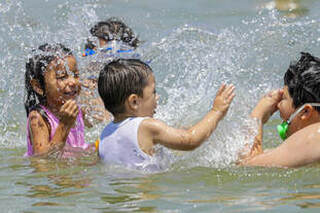 by Christopher Reynolds for Bergen Review Summer always means water, whether it’s an ocean, lake, river, swimming pool or hot tub. But now that we’re worrying more about germs, it’s natural to wonder: Will this season’s swimming, surfing, floating and soaking be as safe as it used to be? Yes, many experts say. “There is no data that somebody got infected this way [with coronavirus],” said professor Karin B. Michels, chair of UCLA’s Department of Epidemiology, in a recent interview. “I can’t say it’s absolutely 100% zero risk, but I can tell you that it would never cross my mind to get COVID-19 from a swimming pool or the ocean,” said Paula Cannon, a professor of molecular microbiology and immunology at USC’s Keck School of Medicine. “It’s just extraordinarily unlikely that this would happen.” On web pages giving pandemic advice, the federal Centers for Disease Control say, “There is no evidence that the virus that causes COVID-19 can be spread to people through the water in pools, hot tubs, spas or water play areas.” As both professors noted, the chlorine in most swimming pools is enough to inactivate the virus. The U.S. Masters Swimming organization makes the same point in its coronavirus briefing for frequent pool swimmers. As for rivers, lakes and the ocean, experts say there are no known cases of COVID-19 transmission through those bodies of water. Also, the outdoors is understood to pose less risk than indoors because of free air flow. Surfrider Foundation staff scientist Katie Day has written, “Similar coronaviruses [to COVID-19] have been shown to remain viable and infectious, at least temporarily, in natural freshwater environments including lakes and streams.” But researchers say they aren’t sure if it’s possible for humans to contract COVID-19 that way. Even if it was theoretically possible, “I’m not concerned about the ocean and large lakes,” Michels said. “The dilution effect is so humongous that I don’t think there is a risk that anybody gets infected this way.” Said Cannon: “You’d have to probably drink the entire lake to get an infectious dose of the coronavirus.” Some viruses do make their home in fecal matter carried into the sea with other sewage; that’s why Southern California beaches often are closed immediately after rains. But research so far shows that COVID-19’s principal means of transmission is respiratory, not fecal-oral. So far, scientists say, there is no data suggesting that the COVID-19 virus remains viable in saltwater. They’re also not sure if the virus remains infectious once it has been through a human digestive system or a wastewater treatment plant. “The virus really likes being 37 degrees Centigrade [98.6 degrees Fahrenheit] in human saliva. It likes to be warm and wet,” said Cannon. “Obviously, it can survive outside the body, but the clock is ticking as soon as it leaves our body.” In an analysis of fecal matter from several COVID-19 cases in the journal Nature, no samples were found to be infectious. As the Surfrider Foundation noted in a recent briefing for surfers, Kim Prather, Scripps Institution of Oceanography researcher, is working on a National Science Foundation project to look for the COVID-19 virus in sea-spray droplets in coastal waters that receive regular sewage flows. “Clearly, more research is needed on this particular virus,” Prather told L.A. Times reporter Rosanna Xia in April, “to determine whether it loses infectiousness through sewage treatment and exposure to air, sunlight and water.” Rather than worry about coronavirus in water, UCLA’s Michels and USC’s Cannon said, swimmers should stay well separated and take care before and after entering the pool, lake, river or sea. “I would be more concerned about touching the same lockers or surfaces in the changing room or on the benches outside the pool. Those are higher risk than the water itself,” Michels said. “The other thing is you have to maintain distance. … More distance is always better.” At least one other potential threat in the water whose prevalence is confirmed by data: drowning. Long before the pandemic began, the CDC was estimating 10 unintentional drowning deaths per day in the United States. Worldwide, the World Health Organization estimates 320,000 drowning deaths per year. If you’re on your own in a pool, lake or the sea, Cannon said, “You’re way more likely to drown than get COVID.”
0 Comments
Leave a Reply. |
Written, Compiled & Edited byThe Bergen Review Media Team
�
Archives
April 2024
Categories
All
|
|
Bergen Review Media is a
WebClientReach, llc Company |
50 East Ridgewood Ave. #215
Ridgewood, NJ 07050 Phone: (201) 948-5500 |
The Bergen Review is Bergen county's concierge for the best businesses, restaurants & venues in New Jersey. Our agency has a combined total of over 15 years experience in online media and marketing. Our team of experts scour every nook and cranny of New Jerseys best businesses, restaurants & venues to present to our clients the full scoop of where best deals & experiences are. Even after researching & looking at reviews, finding the REAL scoop on what Businesses, restaurants or venues best fit your interest can be a challenge. Bergen Review Media has a team that researches & visits various establishments. Making sure the consumer gets the best experience.
|
Website by Bergen Review Media

 RSS Feed
RSS Feed






